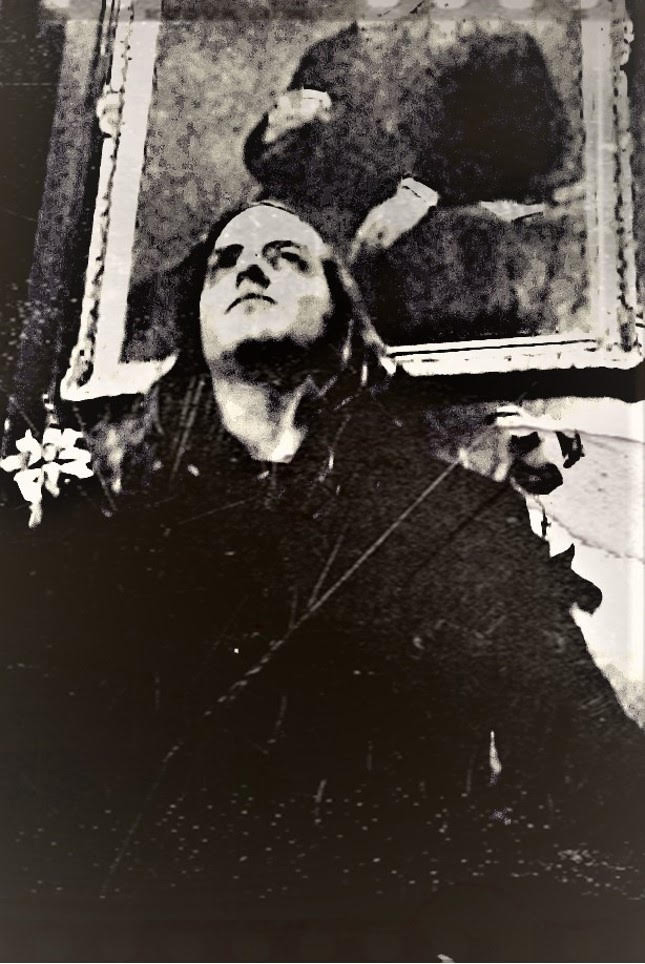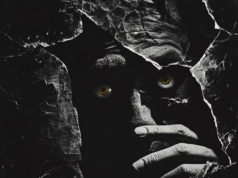Daron Beck would never be mistaken for a John Legend-type vocalist. The Pinkish Black frontman’s projection and bravado reveal no less strength of voice, but his oeuvre up to this point has been much more Nick Cave commingling with Peter Murphy than Al Green partying with Paul McCartney — characteristically dark and ominous rather than the velvety smoothness of an R&B soulster or the syrupy sweetness of your average pop singer. In other words, it’s not the typical voice one might imagine when they think of a “great singer.”
Yet, however unlike the prototypical vocalist one might envision, Beck is no less sonant or adept. He has sneakily impressive range and control, an undeniable viva voce skillset made all the more remarkable by his singularly unique tone. He has a vocal savviness that a decade-plus of fronting the ghostly doom that Pinkish Black and former incarnation The Great Tyrant are known for perhaps hasn’t really highlighted.
“If you listen back to early Pinkish Black or especially The Great Tyrant, there’s a lot of vocal stuff I’m doing, but the music is so abrasive and loud, it just doesn’t translate,” Beck said. “I sing a lot of falsetto on that stuff, but it doesn’t always make people go, ‘Oh, he’s got a great vocal octave range.’ It mostly makes them go, ‘Oh, that’s … weird.’ ”
Since the duo Pinkish Black has largely been stalled by the pandemic and drummer John Teague relocated to New Mexico, Beck has been filling his time by using that vocal range on other projects. The last several months have seen him lend his voice to a series of incredible soft rock covers with the underground supergroup Zombi and Friends. He also contributed a guest track on the recent, massive quadruple album Jeff by O. Deletron (of which I am a member), and he’s just released a new EP of Italio dancewave from his new duo, Information_Age.
On suddenly finding himself an in-demand vocalist, Beck is demure.
“It’s unexpected,” he said. “I always kind of envision myself as like a bridge troll that crawls out to do his weird little thing and then crawls back under the hole. To be put in these positions where it’s like, ‘Oh, sing to this extremely dancey stuff’ or to sing ‘Captain of Her Heart’ by Double, this extremely mellow stuff — I’m stoked. I can do all that. I do it in my car all the time.”
Zombi and Friends is likely the most buzz-eliciting project Beck has been involved with lately. Featuring Zombi duo Steve Moore and AE Paterra, Jeff Gretz of Zao, guitarist Phil Manley of Trans Am, and bassist Bryan Richie of The Sword, the project serves up a steady drip of nostalgia porn. Soft rock covers like the Doobie Brothers’ “Takin’ it to the Streets” and Neil Diamond’s “America” perfectly straddle the fence between silly fun and serious homage. The songs are so meticulously and faithfully reproduced that there is no denying the musicians’ genuine affection for the music.
“I have a deep, deep love of soft rock music from the ’70s and ’80s,” Beck said. “This [project] is just so up my alley, and I’ve been wanting to do something like this for a long time. The fact that I’m getting to do it with dudes from Zombi, Trans Am, The Sword, and Zao is icing on the cake.”
With Information_Age, Beck teamed up with Pallbearer bassist Joseph D. Rowland for a six-song EP of infectious synthwave that’s every bit as sexy as it is spooky. The pulsing keyboards and pumping beats allowed Beck to vocally channel some of his favorite sophisti-pop artists like Danny Wilson and ABC.
“I never get to try really dramatic sophisti-pop vocals,” Beck said. “I wanted to try some of that stuff and see where it fit in the mix. It does give it a sort of Bauhaus, Depeche Mode vibe, which I’m totally fine with.”
Debuting just over a week ago, the self-titled collaboration originally began in 2018, but Beck acknowledges an unintended timeliness with its delayed pandemic-era release.
“It seems like such an appropriate time because of the lyrical content of the record,” he said. “It talks about the end of the world and desolate landscapes and everything’s just gone. With [the single] ‘We Were Alive,’ the repeating chorus is ‘Everything’s gone.’ We were working on it when the toilet paper shortage was happening, and all I could think about was ‘Oh, all the toilet paper’s gone.’ ”
With these projects allowing him to stretch his vocal abilities more, Beck said he looks forward to seeing how he can apply what he’s learned about his singing going forward.
“I’m actually wanting to start writing music that’s more like stuff I would listen to,” he said. “A lot of the music I write is more therapeutic for me than enjoyable. For our audience, they love it, but for me, it’s a pain to sit and listen to my own shit. It’s extremely dark and depressing. It’s not that I want to write anything happy. That’s just not what’s there. I just want to do stuff that’s more complex, like Steely Dan or Magma. Stuff that’s easier on the ears … and probably the brain, too.”












